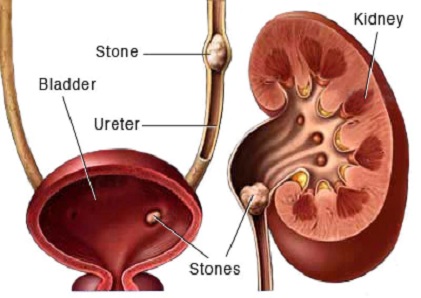Best way to Kidney Stones Treatment?
Kidney stones treatment depends on location of stone, size of stone and presence or absence of any obstruction. The common modalities are:
Endo-Urological Procedures:
Rigid or Flexible Uretero-Renoscopy/ Intra-corporeal Lithotripsy:
This is used to treat any type of Urinary Stones, Recurrent Stones, or stones resistant to the above ESWL treatment. Uretery stones / stones in the lower portion of the kidney are treated using ureteroscopy. This is the procedure done on an outpatient basis and is the least invasive. To enable the urologic surgeon to observe the stone, a fiberoptic ureteroscope of small diameter, is placed into the ureter, through the bladder. The stones are then broken into smaller fragments by the help of surgical instruments. They can then use surgical instruments to remove the stone, or a laser to break it into smaller pieces that can be passed in the urine.
RIRS:
The surgical procedure of the kidney using a fiberoptic endoscope the viewing tool is called Retrograde intrarenal surgery (RIRS). It is performed only by RIRS special experienced
endourologist and is a better,quicker and speedy recovery option over surgery. This endoscope is placed retrograde to intrarenal ie in the bladder through the urethra and in the kidney through the ureter. The scope facilitates the urologist to observe the stones and evaporate using an laser probe/ manipulate and remove by forceps/ crush by an ultrasound probe, etc.
PCNL-Percutaneous Nephro-Lithotomy:
This is the treatment for very large, high in complexity kidney stones in one kidney. It requires an overnight stay and thus an inpatient procedure. It is a very safe and effective treatment capable of clearing all the large stones in one go and complex stones in a repeat procedure.. A highly expert urologist, assisted by the interventional radiologist, make a small incision to connect a channel directly to the kidney’s drainage system. With help of specialized instruments, the stones are shattered and evacuated out of the kidney through the channel.
Laparoscopic Surgery: (Keyhole Surgery)
In case when kidney/ ureter stones are non responsive to other treatments like PCNL surgery / Endoscopy / ESWL or in patients under the anti-coagulation (blood thinning agents) therapy. It may include a combination of pyeloplasty with laparoscopic pyelolithotomy (kidney stones) / laparoscopic ureterolithotomy (ureter stones. Usually, four small incisions (5mm – 10mm) are made on the abdomen to expose and remove the stones. Post- surgery, an internal stent (fine plastic tube) is then usually placed inside the urinary tract to be removed after 1-2 weeks.
Time of the procedure: 2- 3 days.
All above, treatments are finalized taking into consideration the overall health, severity, age and other ailments of the patient.
Reach Out to Dr. Salanki’s Center for Urology for Kidney Stones Treatment….


